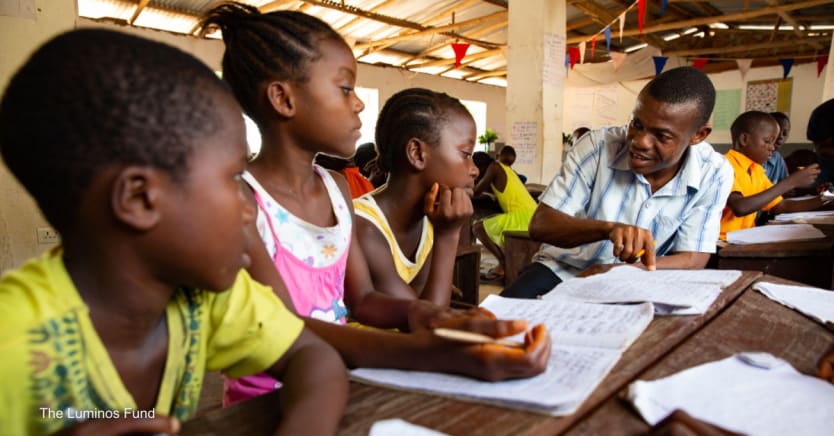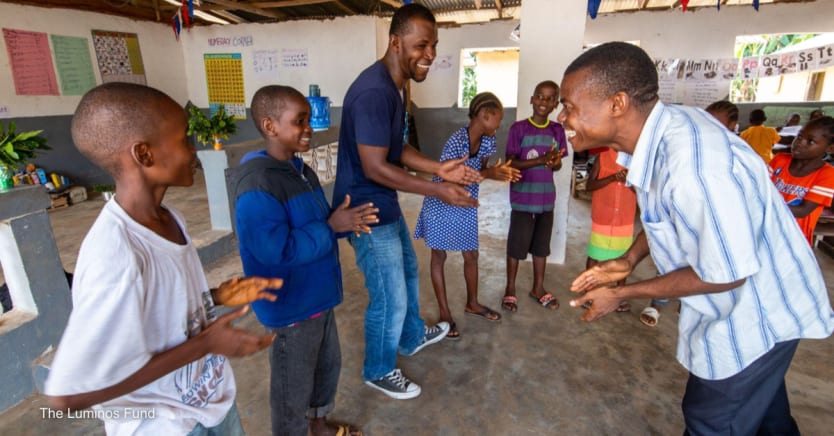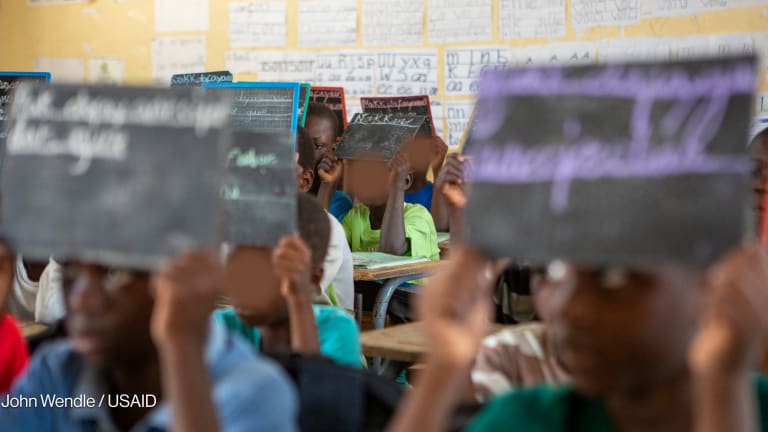
As children return to classrooms following years of school closures due to the COVID-19 pandemic, the global crisis of learning loss resulting from that interruption has educators and policymakers racing to get students back on track.
One method in the spotlight is accelerated education programs, or AEPs, which provide educational opportunities in compressed timeframes for students who have missed schooling. The most effective AEPs cut the length of instruction by two-thirds, emphasize literacy and numeracy, build strong links with the community, and teach children in a way that emphasizes activities.
Most AEPs in low-income countries started in post-conflict settings and have historically focused on children who were refugees or internally displaced — or even ex-combatants, such as in the case of South Sudan. Now, lessons from AEPs are being applied to help students in the wake of the pandemic, and have the potential to help many more children if they’re expanded, according to a new guide for governments published Wednesday by Education.org, a foundation working to support evidence-based education policy.
The latest figures from the World Bank suggest 70% of 10 year olds in low- and middle-income countries are now unable to read a simple written text. As leaders around the world determine how to help students recover the learning lost over the course of COVID-19 — a focus of next week’s United Nations Transforming Education Summit — they can learn from countries in West and East Africa that have implemented AEPs.
Liberia is one such country. Even prior to the pandemic, 20% of primary school-aged children in Liberia were estimated to be out of school — due to factors including a civil war that ended in 2003 and the 2014 Ebola outbreak. Eighty percent of children are older than is typical for their grade, with a wide age range in many classrooms. The pandemic exacerbated those issues.
“We could not allow COVID to shut down the entire educational system without any step forward.”
— Tarnue Marwolo Bongolee, assistant minister, Liberia Student Personnel ServicesSince 2016, the Luminos Fund, a nonprofit organization focused on helping children return to school, has operated its Second Chance program in Liberia. Luminos funds partners with community-based organizations to target the most vulnerable children between the ages of 8 and 14. Its AEP program — highlighted within one of the country case studies in Education.org’s report — condenses the first three grades of primary education into ten months, and it caps classrooms at 25 students in a highly interactive environment. Luminos has graduated more than 12,600 children, with 90% transitioning successfully to mainstream government school, according to the Education.org case study.
Luminos Fund classrooms teach children the basics of literacy and numeracy, paying special attention to phonics, or teaching the sounds associated with letters.
Though the Liberian government closed all classrooms at the beginning of the pandemic, Luminos Fund introduced a strategy called micro-teaching, said Augustine Sumo, a Luminos teacher for the past five years. He taught three sessions a day, with smaller groups of eight to ten students. Masks were required, buckets were placed at the door for hand washing, and students took reading materials and workbooks home with them, Sumo said.
Now, the Luminos Fund program is expanding through a partnership with the Liberian government, allowing the organization to use classrooms and other public spaces for three years at no cost.
Meanwhile, the Liberian government introduced some innovative education interventions of its own during the pandemic: for example, it rolled out teaching by radio, together with partners including the U.S. Agency for International Development, UNICEF, and the Global Partnership for Education.
“We could not allow COVID to shut down the entire educational system without any step forward,” said Tarnue Marwolo Bongolee, Liberia’s assistant minister of Student Personnel Services. Bongolee himself started kindergarten at 10 years old in 1997, between the first and second Liberian civil wars. Now, as schools in Liberia return to their regular academic calendar, Bongolee is confronting the challenge of how to get students back in class and back on track.
The 3 F’s of accelerated learning
Education.org’s founder and CEO, Dr. Randa Grob-Zakhary, summarizes accelerated learning approaches with the 3 F’s: flexibility, “for all,” and focused learning.
Flexibility means creating a learning environment that adapts to the changing needs of the student, with one example being Teaching at the Right Level, an approach pioneered by the Indian NGO Pratham that divides children into groups based on learning needs versus age or grade.
“For all” refers to inclusivity. As an example, Grob-Zakhary highlighted Sierra Leone’s National Policy on Radical Inclusion in Schools, which aims to ensure that historically marginalized groups can enroll and remain in school.
Opinion: How will countries make up for lost learning during the pandemic?
Catch-up and remedial forms of education have been considered recently due to the time and opportunities children lost in the pandemic. But what type will these be, and how much will they cost?
And focused learning means providing children with foundational learning skills, while also helping them advance as quickly as possible, which is critical in settings where crises have forced children out of school.
These accelerated learning approaches can be used for teachers as well as students, Grob-Zakhary said, noting that South Sudan has used accelerated training of instructors to address teacher shortages.
Using these accelerated learning approaches could lead the global economy to recover more than $1 trillion a year from future gross domestic product lost to the pandemic, she said.
In addition to its more extensive report on AEPs, Education.org produced a technical brief outlining five lessons to guide policymakers who seek to implement these learning approaches.
For example, some AEPs operate with no links to national policies, whereas others are fully integrated into national systems and may even be implemented by governments, so policymakers should consider how AEPs work best within their national education systems.

Building the evidence base
Recent efforts to apply AEP approaches to the formal school system could yield important insights for policymakers seeking to borrow from AEPs for the COVID-19 recovery.
For example, in Ethiopia, Speed Schools — an alternative primary education system for out-of-school kids — have helped more than 200,000 children transition to formal schooling in the last 10 years. A range of partners have been involved in the effort, with implementation by civil society organizations, technical guidance from Geneva Global, and funding from a group of international donors.
In 2021, Ethiopia’s ministry of education started a Speed School Unit to scale the program to reach 2 million out-of-school children.
“The whole school system had to start thinking about accelerated learning in a way it never had to do before,” Grob-Zakhary said. “Accelerated learning was an issue just for the out-of-school children. And now it’s an issue that has to be mainstreamed. It has to be an issue of the basic education system, the national government.”
Policymakers can look to lessons from countries that have used accelerated learning approaches to reach out-of-school children as they consider whether to strengthen existing AEPs, exercise more oversight, or try AEPs for the first time, she said. Governments that seek to mainstream accelerated learning approaches may face challenges with standardization. This is because private providers are behind most accelerated learning programs, with a high degree of variation in teacher quality, curriculum, and accountability, she explained.
To ensure this evidence translates to action, Education.org should ensure these insights reach policymakers who are “proven reformers,” said George Werner, Liberia’s minister of education from 2015 to 2018, and a member of the Luminos Fund’s board of directors.
“You are not given ample time for reflection as minister,” he said. “You’re involved in the transaction of stuff, seldom involved in the transformation of stuff.”
With the Transforming Education Summit, the U.N. is “lifting this challenge to the highest level of political leadership,” Werner said, and decision-makers should recognize that “while the context may be different, there may be a lesson here for you” in order to turn “best practice into common practice.”








